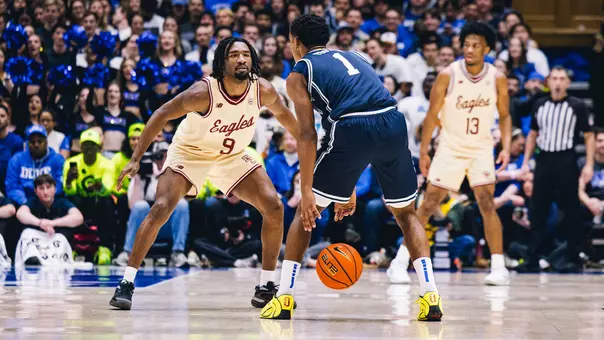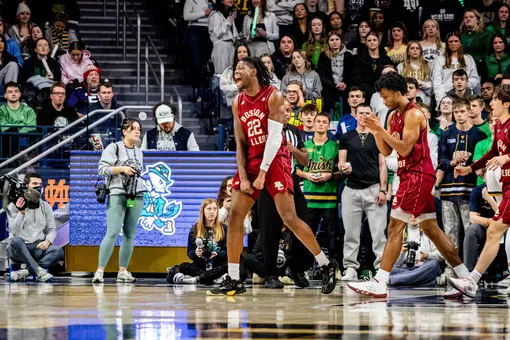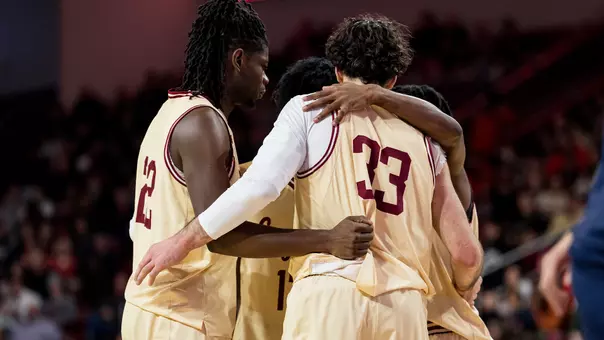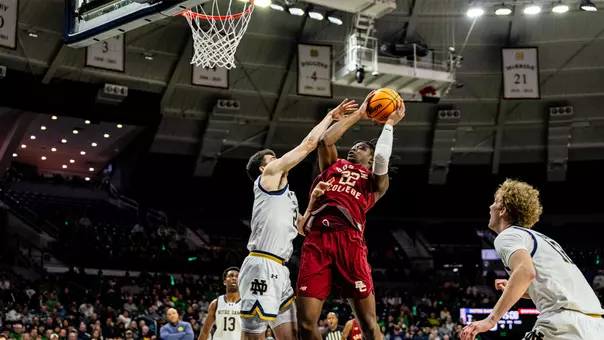Boston College Athletics
Brian Ross: A Lesson In Determination
November 27, 2000 | Men's Basketball
Watch Brian Ross race -- or, better stated, run -- down the Conte Forum hardwood. Don't look at his arms or legs because they don't tell the real story. Rather focus on his face. Look real close. If you can put a face on determination, that's the face. Effort -- 100% effort -- is evident. And, yes, some pain is present as well. For the junior forward from North Quincy, Mass., there is no other way. He, better than anyone else, knows where he's at and what he must do to compete against the nation's best hoopsters. "I'm not blessed with the most athletic ability so I have to get it done in other ways," Ross said. "I have to study my opponent better. I'm not going to outjump anyone, I'm not going to outrun anyone, and I'm not bigger than anybody else. So I have to get it done differently. I have to do the little things that most people don't do. "Every team needs somebody that does the little things. It might be getting a rebound, getting in the way of a pass, getting a deflection or doing something little."
LIFELONG LESSON
It seems to though Ross was well prepared for his current situation. He seems to have gotten a head start in dealing with this predicament. Growing up there were two teams -- one college team and one professional club -- that Ross followed. He didn't select them haphazardly nor capriciously. Rather Ross cheered for and studied teams with players that he admired -- players that he now tries to emulate. Surprisingly, Syracuse was the team that Ross followed as a youngster. He had a special eye for two of the Orangemen's big men. "Syracuse was always a good team," he said. "I'd watch their games on television and watch how players like Derrick Coleman and John Wallace played. They played hard, they played pretty good defense, and they did the little things. They rebounded well and they both could shoot a little bit." On the professional level, Ross' selection should come as no surprise. Living in North Quincy, he rooted for the Boston Celtics. The Green's success may have initially lured him, but the team's hustle and effort kept him in its corner. Larry Bird was his role model. "Larry Bird wasn't very athletically gifted, but he just played so hard," Ross said. "He came to each game as smart as he could. You could tell he'd watched a lot of film and that he'd studied his opponent." Ross also admired Bird's fierce, competitive nature. "I had a poster of Larry Bird," Ross remembered. "Even with all his injuries, there he was diving for a ball out of bounds. The poster said, 'I hate when I see the other team just watch it go out of bounds.' He was relentless. Regardless of his being hurt or tired he'd still be chasing the ball. It inspired me to play hard and be like Larry Bird because he was the best when I was growing up."
DECISION TIME
As Ross was concluding a stellar schoolboy career at North Quincy High School, he had a big decision to make. Where would he choose to continue his basketball career -- and his education? Certainly, he examined many schools. He and his family carefully considered his options. Finally, his choice was clear. "Boston College was definitely the right school for me," Ross said, before listing some reasons. "There's a very good tradition here, and it's a BIG EAST school. Every year BC competes at the highest level. The BIG EAST is more of a physical league than a finesse league. That's serious basketball -- physical and tough. "Academically, I'd leave school with a BC degree. I'd be able to say not only that I was a Division I athlete, but also a Boston College graduate and that goes a long way in the real world."
MAKING IT AT THE HEIGHTS
Ross' first two years at Boston College have been rewarding, challenging and tough -- all at the same time. After setting the North Quincy High School career scoring record (1520 points), Ross had to reset and regroup when he landed at the Heights. Ross made the initial adjustment without much difficulty. His off-the-court transition was made easier because some of his high school buddies were already at BC. He also enjoyed the luxury of being able to return to his nearby home whenever he felt the need. "Those things made my adjustment much easier," Ross said. "The coaching staff also made me feel comfortable around them and around the program." The school's rigorous academic program also offered Ross some challenges -- challenges he gladly accepted. "The academics were -- and still are -- very difficult, but all that can be taken care of with time and effort," he said. "As long as you do that, you'll be successful." On the court, the "step up" was fairly smooth for Ross. As a freshman, he played in 26 games -- coming off the bench for the first six, before earning a spot in the starting five. He finished the season averaging 8.5 points and a team-high 4.9 rebounds per game. He also shot a team-high 46.5 percent from the field. "The transition wasn't too difficult at first," Ross remembered. "I didn't have any expectations and no one had any expectations for me. I didn't think I'd play and I knew I wasn't the most gifted athlete, so I came in with the attitude that I didn't have anything to lose. "I also had the philosophy that each time on the court might be my last, so I've got to play my hardest." For Ross, this thought process probably hit a little closer to home than for others.
BOTHERSOME BACK
As his freshman season progressed, Ross began to encounter some back problems. As the pain increased, he became more firmly entrenched in his belief to give it his all each and every time he stepped on the floor. "For me, especially with my bad back, I take that philosophy to heart," Ross said. "Sometimes I feel like I can't even walk it gets so bad. Sometime I might dive for a loose ball and do some damage." Ross now has a couple of additional reasons to maintain his one-game-at-a-time attitude. He quickly cites the cases of teammates Dwayne Pina and Erik Witt. Pina had his final season of eligibility ended before it started when he was diagnosed with a cardiomyopathy this past summer. Witt, whose situation hits especially close for Ross, has been sidelined by a back injury that forced him to undergo surgery back in Germany this past summer. Nevertheless, Ross has battled through his pain -- but not without some frustration. "It certainly weighs on my mind," Ross said of his back injury. "Especially when I feel like I'm not playing up to my ability, like when there's a play I should have made. I get down if I'm not effective. "I think everybody should do everything they can possibly do to make sure they at least play as hard as they can because it doesn't take a lot to play hard. Good things happen to those that do."
DETERMINED TO SUCCEED
As much as Ross has enjoyed his first two years at the Heights -- challenges, pain and all -- he still has his eye on much greater success for the Eagles. "We haven't won very many games," Ross said. "I've only won six BIG EAST games in my first two years, so obviously that's a low for me." Yet he looked back on his first two seasons with an analytical eye. As a freshman, he recalled the camraderie and team unity. "It really felt like a team," he said. "We were a family. We were going out every day and putting in our effort and doing it together. We came in and tried to get better every day. It felt great, like a real team." Last year, with the infusion of new talent, Ross grew excited about the team's prospects and its future. Unfortunately, it was his personal woes that sometimes got the better of him. "With my injury it got to the point where I honestly felt like I was coming to practice saying, 'Do I really have to come to practice today?' It was the same on game days. It got to the point where I almost didn't feel like I wanted to play anymore. "That might not seem like a big deal, but my whole life was dedicated to the sport and wanting to get to this level and now, when I finally get to where I want to go, it feels like I almost betrayed myself because I was feeling that way."
OPTIMISTIC OUTLOOK
As Ross looked toward the future, he instinctively adopted a positive attitude. He'd lived and learned in his first two years in Chestnut Hill. Now, he was equally determined to make his two remaining years even better -- much better. "As a freshman I think I did better than anyone thought I would. As a sophomore I didn't feel like I improved," he said. "This year I want to get healthy. I want to help the team as much as I can. That's not scoring 20 points per game. It's having a good shooting percentage. When I have the opportunity to shoot, I have to take full advantage. It's making defensive plays, getting rebounds and doing the little things I've proven I can do."


















